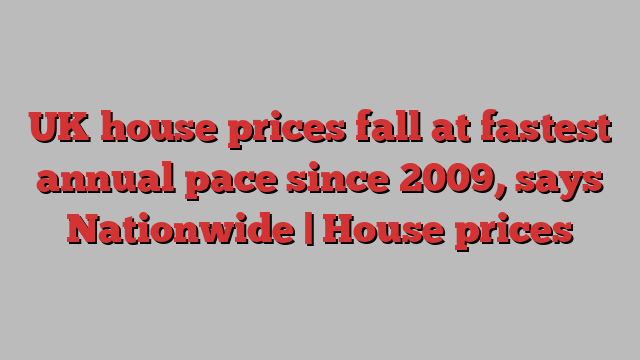
UK house prices fell at the fastest annual rate in nearly 14 years in May, as Nationwide building society warned that “headwinds” for the housing market were likely to increase in the coming months as high inflation fuels expectations of further interest rate rises.
Prices decreased by 3.4% in the 12 months to May compared with 12 months earlier – representing the biggest drop seen since July 2009 when an annual fall of 6.2% was recorded. The steep drop follows tentative signs of improvement in April, when they showed a shallower slide of 2.7%.
House prices dipped 0.1% from a month earlier, after a more positive showing in April, when prices rose for the first time in seven months.
Nationwide said house prices largely remained flat over the past month after seasonal effects had been taken into account, taking the average price of a home in the UK to £260,736.
That remains 4% below the peak seen in August 2022, before former prime minister Liz Truss’s disastrous autumn mini-budget resulted in borrowing rates shooting up for prospective buyers and those remortgaging their homes.
Robert Gardner, the Nationwide chief economist, warned that “headwinds to the housing market look set to strengthen” over the coming months.
Recent disappointing inflation figures have prompted economists to forecast that the Bank of England could raise the cost of borrowing to more than 5% by the end of the year, prompting banks and building societies to pull almost 800 residential and buy-to-let mortgage deals over the past few days.
Homeowners looking for new mortgage deals have been warned to prepare for fixed-rate offers above 5% in the coming weeks.
Interest rates “are also projected to remain higher for longer”, Gardner said.
“If maintained, this is likely to exert renewed upward pressure on mortgage rates, which had been trending down after spiking in the wake of the mini-budget in September last year.”
Recent figures from the Bank of England have showed some signs of recovery in activity in the housing market, although the number of mortgages approved for house purchases in March remained about 20% below pre-pandemic levels.
Marc von Grundherr, a director of the London-focused estate agent Benham and Reeves, said: “We’ve seen a promising start to the year so far in terms of buyer interest returning to the market but what we’re simply not seeing is this interest convert at the same rate.”
He added: “Buyer hesitation has been largely spurred by increasing interest rates and while the market is standing firm, it’s this more tentative approach to buying that is causing house prices to stutter.”
Matt Thompson, the head of sales at the estate agent Chestertons, described May as “a positive month for sellers”.
He added: “We witnessed an evident increase in buyer inquiries and actual offers being made.”
Despite the warnings about the impact of higher interest rates on the housing market, Nationwide does not believe that house prices are likely to fall significantly, even if there are fewer sales in the coming months.
“Healthy rates of nominal income growth, together with modestly lower house prices, should help to improve housing affordability over time, especially if mortgage rates moderate once [the] bank rate peaks,” Gardner said.